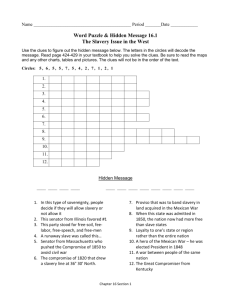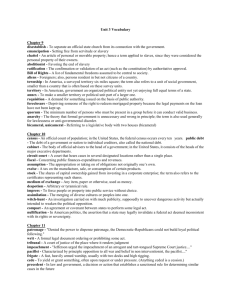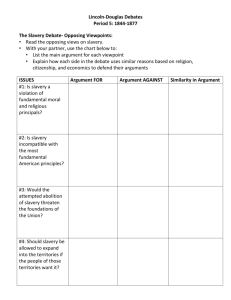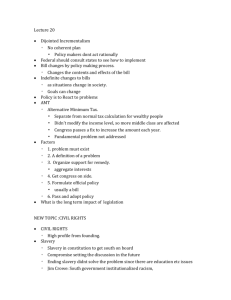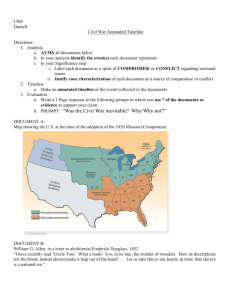4.1 Mexican War 3.doc
advertisement
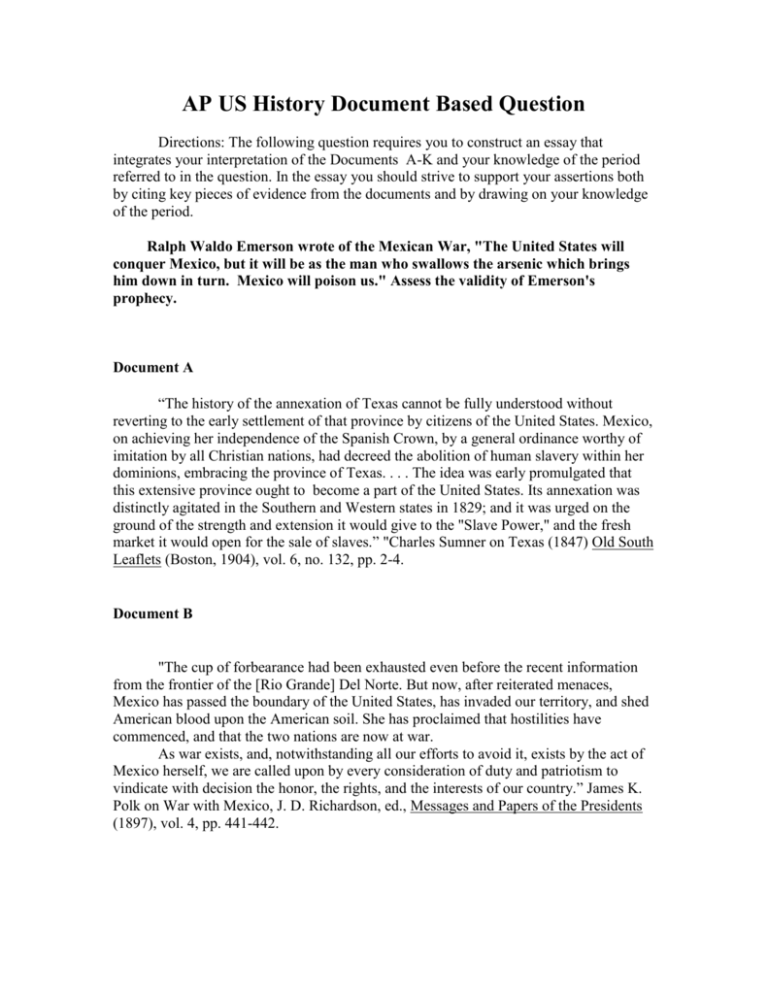
AP US History Document Based Question Directions: The following question requires you to construct an essay that integrates your interpretation of the Documents A-K and your knowledge of the period referred to in the question. In the essay you should strive to support your assertions both by citing key pieces of evidence from the documents and by drawing on your knowledge of the period. Ralph Waldo Emerson wrote of the Mexican War, "The United States will conquer Mexico, but it will be as the man who swallows the arsenic which brings him down in turn. Mexico will poison us." Assess the validity of Emerson's prophecy. Document A “The history of the annexation of Texas cannot be fully understood without reverting to the early settlement of that province by citizens of the United States. Mexico, on achieving her independence of the Spanish Crown, by a general ordinance worthy of imitation by all Christian nations, had decreed the abolition of human slavery within her dominions, embracing the province of Texas. . . . The idea was early promulgated that this extensive province ought to become a part of the United States. Its annexation was distinctly agitated in the Southern and Western states in 1829; and it was urged on the ground of the strength and extension it would give to the "Slave Power," and the fresh market it would open for the sale of slaves.” "Charles Sumner on Texas (1847) Old South Leaflets (Boston, 1904), vol. 6, no. 132, pp. 2-4. Document B "The cup of forbearance had been exhausted even before the recent information from the frontier of the [Rio Grande] Del Norte. But now, after reiterated menaces, Mexico has passed the boundary of the United States, has invaded our territory, and shed American blood upon the American soil. She has proclaimed that hostilities have commenced, and that the two nations are now at war. As war exists, and, notwithstanding all our efforts to avoid it, exists by the act of Mexico herself, we are called upon by every consideration of duty and patriotism to vindicate with decision the honor, the rights, and the interests of our country.” James K. Polk on War with Mexico, J. D. Richardson, ed., Messages and Papers of the Presidents (1897), vol. 4, pp. 441-442. Document C “Liberty Follows” Document D “But, sir, the issue now presented is not whether slavery shall exist unmolested where it now is, but whether it shall be carried to new and distant regions, now free, where the footprint of a slave cannot be found. This, sir, is the issue. Upon it I take my stand, and from it I cannot be frightened or driven by idle charges of abolitionism. I ask not that slavery be abolished. I demand that this government preserve the integrity of free territory against the aggressions of slavery--against its wrongful usurpations. . . . We are fighting this war cheerfully, not reluctantly--cheerfully fighting this war for Texas; and yet we seek not to change the character of her institutions. Slavery is there; there let it remain. . . . Now, sir, we are told that California is ours, that New Mexico is ours--won by the valor of our arms. They are free. Shall they remain free? Shall these fair provinces be the inheritance and homes of the white labor of freemen or the black labor of slaves? This, sir, is the issue--thisthe question. The North has the right, and her representatives here have the power. . . . There is no question of abolition here, sir. Shall the South be permitted, by aggression, by invasion of the right, by subduing free territory and planting slavery upon it, to wrest these provinces from Northern freemen. . . ?” David Wilmot on Texas, Congressional Globe, 29th Congress, 2d session, Appendix, p. 315 (February 8, 1847). Document E Document F “. . . When the people of the North shall all be rallied under one banner, and the whole South marshaled under another banner, and each section excited to frenzy and madness by hostility to the institutions of the other, then the patriot may well tremble for the perpetuity of the Union. Withdraw the slavery question from the political arena, and remove it to the states and territories, each to decide for itself, such a catastrophe can never happen. Then you will never be able to tell, by any Senator's vote for or against any measure, from what state or section of the Union he comes. Why, then, can we not withdraw this vexed question from politics? Why can we not adopt the [popular sovereignty] principle of this [Kansas-Nebraska] bill as a rule of action in all new territorial organizations? Why can we not deprive these agitators of their vocation, and render it impossible for Senators to come here upon bargains on the slavery question? I believe that the peace, the harmony, and perpetuity of the Union require us to go back to the doctrines of the Revolution, to the principles of the Constitution, to the principles of the Compromise of 1850, and leave the people, under the Constitution, to do as they may see proper in respect to their own internal affairs. Mr. President, I have not brought this question forward as a Northern man or as a Southern man. I am unwilling to recognize such divisions and distinctions. I have brought it forward as an American Senator, representing a state which is true to this principle, and which has approved of my action in respect to the Nebraska bill. I have brought it forward not as an act of justice to the South more than to the North. I have presented it especially as an act of justice to the people of those territories, and of the states to be formed therefrom, now and in all time to come. . . . I say frankly that, in my opinion, this measure will be as popular at the North as at the South, when its provisions and principles shall have been fully developed and become well understood.” "Stephen Douglas on Popular-Sovereignty Plea (1854), Congressional Globe, 33d Congress, 1st session (March 3, 1854), Appendix, p. 338. Document G “Mr. President, it is passion, passion—party, party, and intemperance—that is all I dread in the adjustment of the great questions which unhappily at this time divide our distracted country. Sir, at this moment we have in the legislative bodies of this Capitol and in the States, twenty old furnaces in full blast, emitting heat, and passion, and intemperance, and diffusing them throughout the whole extent of this broad land. Two months ago all was calm in comparison to the present moment. All now is uproar, confusion, and menace to the existence of the Union, and to the happiness and safety of this people. Sir, I implore senators, I entreat them, by all that they expect hereafter, and by all that is dear to them here below, to repress the ardor of these passions, to look to their country, to its interests, to listen to the voice of reason—not as it shall be attempted to be uttered by me, for I am not so presumptuous as to indulge the hope that any thing I may say will avert the effects which I have described, but to listen to their own reason, their own judgment, their own good sense, in determining upon what is best to be done for our country in the actual posture in which we find her. Sir, to this great object have my efforts been directed during the whole session.” Senator Henry Clay's Compromise Speech, 1850, Courtesy University of Kentucky, Mary I. King Library. The Life, Correspondence and Speeches of Henry Clay, Vol III, ed. Calvin Colton, p. 302-345. Document H “Mr. President: I wish to speak to-day, not as a Massachusetts man, nor as a Northern man, but as an American, and a member of the Senate of the United States. It is fortunate that there is a Senate of the United States,—a body not yet moved from its propriety, not lost to a just sense of its own dignity, and its own high responsibilities, and a body to which the country looks with confidence for wise, moderate, patriotic, and healing counsels. It is not to be denied that we live in the midst of strong agitations, and are surrounded by very considerable dangers to our institutions of government. The imprisoned winds are let loose. The East, the West, the North, and the stormy South, all combine to throw the whole ocean into commotion, and to toss its billows to the skies, and to disclose its profoundest depths. I do not affect to regard myself, Mr. President, as holding, or as fit to hold, the helm in this combat of the political elements; but I have a duty to perform, and I mean to perform it with fidelity,—not without a sense of surrounding dangers, but not without hope. I have a part to act, not for my own security or safety, for I am looking out for no fragment upon which to float away from the wreck, if wreck there must be, but for the good of the whole, and the preservation of the whole; and there is that which will keep me to my duty during this struggle, whether the sun and the stars shall appear, or shall not appear for many days. I speak today for the preservation of the Union. ''Hear me for my cause.'' Senator Daniel Webster's ''Seventh of March'' Speech, 1850, Dartmouth College Library, ''Speech of the Hon. Daniel Webster upon the Subject of Slavery.'' p. 1-36 Delivered in the Senate of the United States, March 7, 1850. Document I “An ordinance to dissolve the union between the State of South Carolina and other states united with her under the compact entitled ''The Constitution of the United States of America'': We, the people of the State of South Carolina in Convention assembled, do declare and ordain, and it is hereby declared and ordained, that the ordinance adopted by us in Convention on the twenty-third day of May, in the year of our Lord 1788, whereby the Constitution of the United States of America was ratified, and also all acts and parts of acts of the General Assembly of this State ratifying amendments of the said Constitution, are hereby repealed; and that the union now subsisting between South Carolina and the other States, under the name of the ''United States of America'' is hereby dissolved.” South Carolina Ordinance of Secession, 1860, University of South Carolina, South Caroliniana Library, Columbia, SC. Done at Charleston the twentieth day of December, in the year of our Lord, 1860. Document J Resolved by the Senate and House of Representatives of the United States of America in Congress assembled two-thirds of both Houses concurring). Article 1. In all the territory of the United States now held, or hereafter acquired, situate north of latitude 36 degree 30', slavery or involuntary servitude, except as a punishment for crime, is prohibited while such territory shall remain under territorial government. In all the territory south of said line of latitude, slavery of the African race is hereby recognized as existing, and shall not be interfered with by Congress, but shall be protected as property by all the departments of the territorial government during its continuance. Art. 2. Congress shall have no power to abolish slavery in places under its exclusive jurisdiction, and situate within the limits of States that permit the holding of slaves. Art. 3. Congress shall have no power to abolish slavery within the District of Columbia, so long as it exists in the adjoining States of Virginia and Maryland. Art. 4. Congress shall have no power to prohibit or hinder the transportation of slaves from one State to another . . . Crittenden Compromise of 1860, The Political History of the United States of America During the Great Rebellion, 1860-65, ed. Edward McPherson, p. 64-65. Document K
